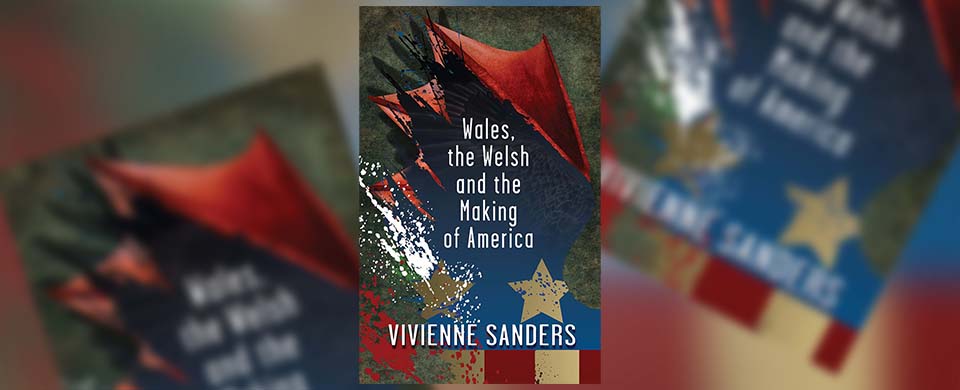The Welsh in America: a bitter-sweet story
Steve Howell reviews ‘Wales, the Welsh and the Making of America’ by Vivienne Sanders, University of Wales Press.
History, you might say, is in the eyes of the beholder. Just as views on Wales’s colonisation by England depend on your national perspective, so too do opinions about the role of Welsh people in the ‘making’ of America, which is never going to be heroic to Native Americans whose ancestors were nation-building long before any Europeans found their way across the Atlantic.
Vivienne Sanders is sensitive to this conundrum in her book ‘Wales, the Welsh and the making of America’, though it should more accurately be called ‘the making of the United States’. In attempting to cover the whole topic – from the possibility that Prince Madoc ‘discovered’ America long before Columbus to the Welsh ancestry of Hillary Clinton – she has been careful to note different perspectives as she goes along.
The claim that Madoc landed on the Gulf coast in 1170 and built fortifications along the Alabama River is, for example, mired in controversy. It implies, as Sanders explains, that because the buildings were more sophisticated “they had to have been created by white men rather than Native Americans”. In 1953, a plaque presenting the Madoc legend as fact was erected at a military museum in Alabama by Daughters of the American Revolution (DAR). In 2008, it was put in storage – on the pretext of protecting it from a hurricane – until the Alabama Welsh Society mounted a campaign for it be reinstated and secured the compromise of it being moved to the DAR’s premises in Mobile, where it is still on display.
Leaving princes aside, at the heart of this book is a paradox: most Welsh migrants who went to America were escaping persecution or economic hardship, yet they – along with other Europeans desperate for a better life – became fodder for what can only be described as ethnic cleansing on an epic scale.
I don’t say this lightly because my own family is part of the story. My ancestor John Howell was a Quaker who left Aberystwyth in 1697 with his three sons to try to find religious freedom in the newly-founded city of Philadelphia. The history then follows much the same path that many Welsh families took: farming in Delaware (Howell Mill is now a historic site and county park) and, in the case of my great grandfather, migration west to Omaha, a city named after the Native American tribe that the land was taken from. My American father spent much of his childhood in Omaha, but the story took an ironic turn when, in 1949, he took a job at Liverpool University to escape McCarthyism.
Sanders has done those of us with an interest in the US dimension to Welsh history a valuable service by bringing together so much material in one book. She weaves her way methodically through the Welsh role in early colonisation, the war of independence, Westward expansion, the Civil War and the rapid industrialisation of the late 19th century.
She tells some of it by profiling influential individuals, such as Meriwether Lewis, who with William Clark was appointed by President Jefferson in 1802 to explore the West; David Thomas, who in 1854 founded a company that became the US’s largest anthracite iron producer; Rachel Davies, who in 1890 became the first woman to be ordained as a priest in Wisconsin; and Frank Lloyd Wright, the great 20th century architect who nicknamed one of his daughters ‘Taffy’.
Equally interesting, however, are her accounts of the factors driving the different phases of Welsh migration and of the way Welsh Americans tended to huddle together in specific towns and cities, often with names to match like Brynffynon (Tennessee), Mountain Ash (Kentucky), Cambria County (Pennsylvania), Radnor (Ohio) and Welsh Prairie (Wisconsin). When it came to civil war over the abolition of slavery, these Welsh communities were, she reports, overwhelmingly pro-Union and quick to volunteer.
In the final chapter, Sanders quotes a complaint made in 1909 to Druid, the Welsh American newspaper, that its endless praise of the Welsh was “nauseating” and “not warranted by the facts”. However, her own conclusion is more positive: she argues that Welsh immigrants “contributed more than many other ethnic minority groups” and that she “cannot help but feel that Wales lost many it could ill afford to lose and many that America was lucky to gain.”
While debating which group contributed most is in my view a pointless pursuit, and notwithstanding the inherent settler-colonial nature of the ‘making of America’, I’m wholeheartedly with Sanders when she says that the story of the Welsh in America demonstrates “how much immigrants can contribute to a nation”.
That is arguably an absolute law of history – and it is not something we should claim for ourselves and then deny when it comes to the contribution immigrants have made to Wales.
Steve Howell
This review originally appeared in Planet magazine. Steve is the author of Game Changer, an insider’s account of Labour’s 2017 General Election campaign, and two novels: Over The Line and Collateral Damage.
Order a paperback copy of his latest novel, Collateral Damage, for the special offer of £8.00 including UK post and packing. ORDER
Order a Kindle version of Collateral Damage at £2.99. ORDER
Order a paperback copy of Over The Line at the special price of £6.00, including UK postage ORDER
Order a Kindle version of Over The Line at £1.99 (via Amazon) ORDER

